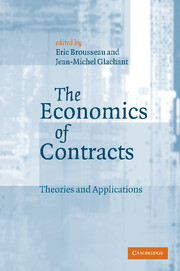Book contents
- Frontmatter
- Contents
- List of figures
- List of tables
- List of contributors
- Acknowledgments
- Part I Introduction
- Part II Contracts, organizations, and institutions
- Part III Law and economics
- 6 The contract as economic trade
- 7 Contract theory and theories of contract regulation
- 8 Economic reasoning and the framing of contract law: sale of an asset of uncertain value
- 9 A transactions-cost approach to the analysis of property rights
- Part IV Theoretical developments: where do we stand?
- Part V Testing contract theories
- Part VI Applied issues: contributions to industrial organization
- Part VII Policy issues: anti-trust and regulation of public utilities
- Bibliography
- Index of names
- Subject index
9 - A transactions-cost approach to the analysis of property rights
Published online by Cambridge University Press: 16 January 2010
- Frontmatter
- Contents
- List of figures
- List of tables
- List of contributors
- Acknowledgments
- Part I Introduction
- Part II Contracts, organizations, and institutions
- Part III Law and economics
- 6 The contract as economic trade
- 7 Contract theory and theories of contract regulation
- 8 Economic reasoning and the framing of contract law: sale of an asset of uncertain value
- 9 A transactions-cost approach to the analysis of property rights
- Part IV Theoretical developments: where do we stand?
- Part V Testing contract theories
- Part VI Applied issues: contributions to industrial organization
- Part VII Policy issues: anti-trust and regulation of public utilities
- Bibliography
- Index of names
- Subject index
Summary
Introduction
Property rights have been receiving considerable press from both policymakers and academic scholars. As well they should. They are among the most critical social institutions, providing the basis for resource-use decisions and for the assignment of wealth and political power. As such, the property regime profoundly influences both economic performance and income distribution in all economies. Property rights define the accepted array of resource uses, determine who has decision-making authority, and describe who will receive the associated rewards and costs of those decisions. Accordingly, the prevailing system of property rights establishes incentives and time horizons for investment in physical and human capital, production, and exchange. Cross-country differences in property rights result in important differences in economic development and growth (Barro 1997; De Soto 2000).
The property-rights structure also is critical for the environment and natural resource use. Complete and well-defined individual or group property rights internalize externalities and, thereby, guide decisionmakers to consider the social consequences of their actions. In this manner, property rights minimize the losses associated with the tragedy of the commons or open-access resources (Hardin 1968; Johnson and Libecap 1982; Ostrom 1990; Deacon 1999; Brown 2000; Rose 2000). Finally, Pipes (1999) argues that private property rights are essential, not only for economic performance, but also for establishing and protecting individual social and political rights within a society.
Despite all of these advantages, property rights are controversial; often are very incomplete; and vary widely across societies in structure and scope. Recent experiences in transitional economies shows that property-rights regimes for valuable assets such as farm land and industrial enterprises cannot be transferred readily from one society to another, regardless of the anticipated benefits of doing so.
- Type
- Chapter
- Information
- The Economics of ContractsTheories and Applications, pp. 140 - 156Publisher: Cambridge University PressPrint publication year: 2002
- 9
- Cited by



